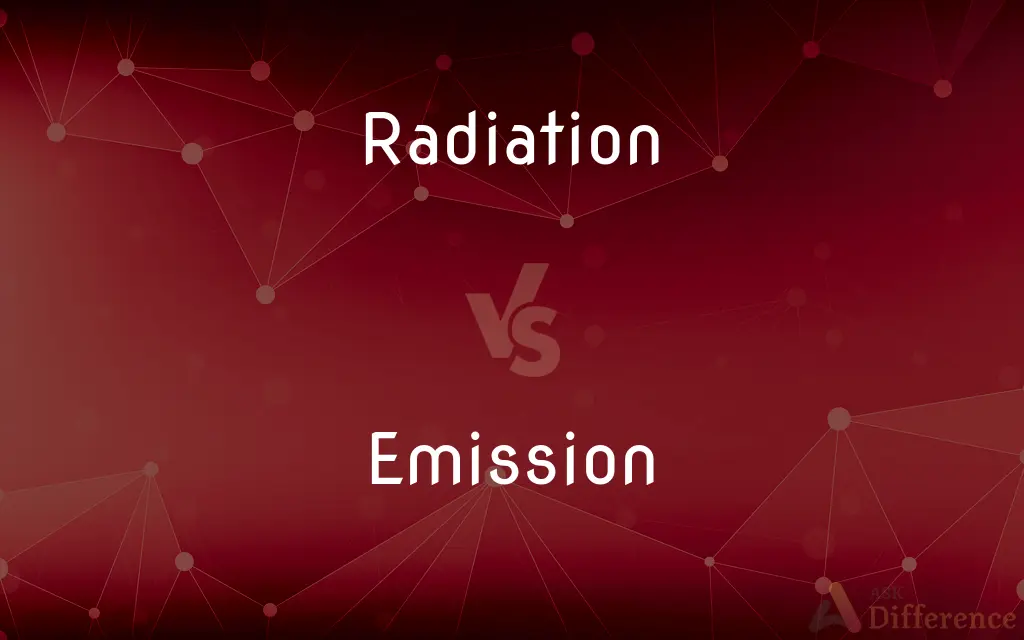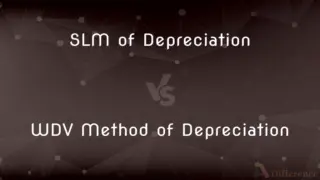Radiation vs. Emission — What's the Difference?
By Tayyaba Rehman — Published on January 17, 2024
Radiation is the process of emitting energy as electromagnetic waves or particles, while emission refers more broadly to the release of substances, energy, or signals into the environment.

Difference Between Radiation and Emission
Table of Contents
ADVERTISEMENT
Key Differences
Radiation involves the release and propagation of energy in the form of waves or particles, such as light, heat, or radio waves. Emission encompasses the broader act of releasing or discharging something, which can include gases, energy, or light.
Radiation can occur naturally, like solar radiation from the sun, or be man-made, such as X-rays. Emissions can be natural, like volcanic gases, or artificial, like exhaust gases from vehicles.
The term radiation often implies a transfer of energy through space or a medium, without the need for a physical substance. In contrast, emissions can involve tangible materials like pollutants or greenhouse gases released into the atmosphere.
Radiation can be ionizing or non-ionizing, affecting matter in different ways. Emission is a broader concept that can refer to any form of output, from sound to light, and does not necessarily involve energy transfer.
In the context of environmental science, radiation refers to the emission of energy, whereas emissions often relate to environmental pollutants and their impact.
ADVERTISEMENT
Comparison Chart
Definition
Release of energy as electromagnetic waves or particles
General release of substances, energy, or signals
Types
Ionizing, non-ionizing
Gas, light, sound, heat
Transfer Medium
Can occur through space or material mediums
Involves the physical release into the environment
Usage in Science
Used in physics to describe energy transfer
Used broadly in various fields for any type of release
Environmental Impact
Often associated with heat or light affecting ecosystems
More associated with pollutants and greenhouse gases
Compare with Definitions
Radiation
Electromagnetic waves
Microwave ovens use radiation to heat food.
Emission
Release of gases
Car emissions contribute to air pollution.
Radiation
Energy transfer
The sun's radiation provides warmth and light.
Emission
Radioactivity release
The reactor had a controlled emission of particles.
Radiation
Solar output
Earth receives solar radiation every day.
Emission
Light output
The lamp's emission was bright and clear.
Radiation
The act or process of radiating
The radiation of heat and light from a fire.
Emission
Heat discharge
The factory's emissions warmed the nearby river.
Radiation
Emission or propagation of energy in the form of waves or particles.
Emission
Sound production
The engine's emission was loud and continuous.
Radiation
Energy radiated or transmitted in the form of waves or particles.
Emission
The act or an instance of emitting.
Radiation
A stream of particles or electromagnetic waves emitted by the atoms and molecules of a radioactive substance as a result of nuclear decay.
Emission
Something emitted.
Radiation
The act of exposing or the condition of being exposed to such energy.
Emission
A substance discharged into the air, as by an internal combustion engine.
Radiation
The application of such energy, as in medical treatment.
Emission
Something which is emitted or sent out; issue.
The emission was mostly blood
Radiation
(Anatomy) Radial arrangement of parts, as of a group of nerve fibers connecting different areas of the brain.
Emission
The act of emitting; the act of sending forth or putting into circulation.
The emission of light from the sun
The emission of heat from a fire
Radiation
Adaptive radiation
Emission
A show; a program.
Radiation
The shooting forth of anything from a point or surface, like diverging rays of light.
Heat radiation
Emission
The act of sending or throwing out; the act of sending forth or putting into circulation; issue; as, the emission of light from the sun; the emission of heat from a fire; the emission of bank notes.
Radiation
The process of radiating waves or particles.
Emission
That which is sent out, issued, or put in circulation at one time; issue; as, the emission was mostly blood.
Radiation
The transfer of energy via radiation.
Emission
The act of emitting; causing to flow forth
Radiation
Radioactive energy.
Emission
A substance that is emitted or released
Radiation
A rapid diversification of an ancestral species into many new forms.
Emission
The release of electrons from parent atoms
Radiation
The act of radiating, or the state of being radiated; emission and diffusion of rays of light; beamy brightness.
Emission
Any of several bodily processes by which substances go out of the body;
The discharge of pus
Radiation
The shooting forth of anything from a point or surface, like the diverging rays of light; as, the radiation of heat.
Emission
The occurrence of a flow of water (as from a pipe)
Radiation
Energy that is radiated or transmitted in the form of rays or waves or particles
Radiation
The act of spreading outward from a central source
Radiation
Syndrome resulting from exposure to ionizing radiation (e.g., exposure to radioactive chemicals or to nuclear explosions); low doses cause diarrhea and nausea and vomiting and sometimes loss of hair; greater exposure can cause sterility and cataracts and some forms of cancer and other diseases; severe exposure can cause death within hours;
He was suffering from radiation
Radiation
The spontaneous emission of a stream of particles or electromagnetic rays in nuclear decay
Radiation
The spread of a group of organisms into new habitats
Radiation
A radial arrangement of nerve fibers connecting different parts of the brain
Radiation
(medicine) the treatment of disease (especially cancer) by exposure to radiation from a radioactive substance
Radiation
Ionizing particles
Radiation therapy is used to treat cancer.
Radiation
Radio waves
Radio stations transmit signals via radiation.
Common Curiosities
What does emission mean?
Emission refers to the release of substances, energy, or signals into the environment.
Are all types of radiation harmful?
Not all radiation is harmful; it depends on the type and level of exposure.
What is radiation?
Radiation is the emission of energy as electromagnetic waves or particles.
What are common sources of emissions?
Common sources include vehicles, factories, and power plants.
Can radiation be seen?
Some forms, like visible light, can be seen, but others, like X-rays, cannot.
How does radiation affect living organisms?
It can cause changes at the cellular level, beneficial or harmful.
What is non-ionizing radiation?
Non-ionizing radiation is a type that doesn't carry enough energy to ionize atoms.
Is CO2 emission contributing to climate change?
Yes, CO2 is a greenhouse gas that contributes to global warming.
Can radiation be used for medical purposes?
Yes, such as in X-rays and radiation therapy for cancer.
Do plants emit anything?
Plants emit oxygen and water vapor during photosynthesis.
Are emissions always related to pollution?
Emissions often refer to pollutants, but they can also be harmless or beneficial.
Is sound an emission?
Yes, sound is considered an emission when it's released into the environment.
What protective measures are used against radiation?
Lead shields and radiation suits are common protective measures.
Can radiation from the sun be harmful?
Yes, prolonged exposure to solar UV radiation can be harmful to skin.
What is the main concern with vehicle emissions?
They contribute to air pollution and environmental degradation.
Share Your Discovery

Previous Comparison
SLM of Depreciation vs. WDV Method of Depreciation
Next Comparison
Akita vs. Shiba InuAuthor Spotlight
Written by
Tayyaba RehmanTayyaba Rehman is a distinguished writer, currently serving as a primary contributor to askdifference.com. As a researcher in semantics and etymology, Tayyaba's passion for the complexity of languages and their distinctions has found a perfect home on the platform. Tayyaba delves into the intricacies of language, distinguishing between commonly confused words and phrases, thereby providing clarity for readers worldwide.












































